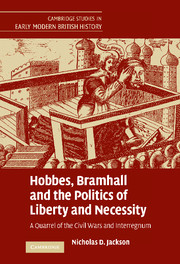 Hobbes, Bramhall and the Politics of Liberty and Necessity
Hobbes, Bramhall and the Politics of Liberty and Necessity Book contents
- Frontmatter
- Contents
- Acknowledgments
- List of abbreviations
- Note on dates and style
- Introduction
- 1 Bishop Bramhall, the ‘Great Arminian’, ‘Irish Canterbury’ and ‘Most Unsound Man in Ireland’, 1633–1641
- 2 Bishop Bramhall, the Earl of Newcastle, Thomas Hobbes and the First English Civil War
- 3 Hobbes's flight to France, De Cive and the beginning of the quarrel with Bramhall, summer 1645
- 4 An epistolary skirmish, 1645–1646: Bramhall's ‘Discourse’, Hobbes's ‘Treatise’ and Bramhall's ‘Vindication’
- 5 Bramhall and the royalist schemes of 1646–1650
- 6 Hobbes and Leviathan among the exiles, 1646–1651
- 7 The public quarrel: Hobbes, Of Liberty and Necessity, 1654, Bramhall, Defence of True Liberty, 1655 and Hobbes, Questions concerning Liberty, Necessity and Chance, 1656
- 8 Castigations of Hobbes's Animadversions and The Catching of Leviathan, 1657–1658: Hobbes as Leviathan of Leviathans
- 9 The Restoration and death of Bramhall and Hobbes's last word, 1668
- Conclusion
- Bibliography
- Index
- Cambridge Studies in Early Modern British History
5 - Bramhall and the royalist schemes of 1646–1650
Published online by Cambridge University Press: 17 July 2009
- Frontmatter
- Contents
- Acknowledgments
- List of abbreviations
- Note on dates and style
- Introduction
- 1 Bishop Bramhall, the ‘Great Arminian’, ‘Irish Canterbury’ and ‘Most Unsound Man in Ireland’, 1633–1641
- 2 Bishop Bramhall, the Earl of Newcastle, Thomas Hobbes and the First English Civil War
- 3 Hobbes's flight to France, De Cive and the beginning of the quarrel with Bramhall, summer 1645
- 4 An epistolary skirmish, 1645–1646: Bramhall's ‘Discourse’, Hobbes's ‘Treatise’ and Bramhall's ‘Vindication’
- 5 Bramhall and the royalist schemes of 1646–1650
- 6 Hobbes and Leviathan among the exiles, 1646–1651
- 7 The public quarrel: Hobbes, Of Liberty and Necessity, 1654, Bramhall, Defence of True Liberty, 1655 and Hobbes, Questions concerning Liberty, Necessity and Chance, 1656
- 8 Castigations of Hobbes's Animadversions and The Catching of Leviathan, 1657–1658: Hobbes as Leviathan of Leviathans
- 9 The Restoration and death of Bramhall and Hobbes's last word, 1668
- Conclusion
- Bibliography
- Index
- Cambridge Studies in Early Modern British History
Summary
Hobbes offered no reply to Bramhall's ‘Vindication’ and the bishop must have been content to let that paper stand as the last word. After their engagement in Paris in the summer of 1645, Hobbes spent the next few years in France while Bramhall resided principally in the southern Netherlands. Both men had more than enough other business with which to occupy themselves. For Bramhall and the rest of the anglican clergy in exile, the ultimate task was to restore the king and themselves in England, Ireland and Scotland. Before and after the debate in Paris, Bramhall appears to have lived mostly in Brussels, with the king's resident, Sir Henry de Vic. While mainly in Brussels in the years 1644–8, Bramhall busied himself in various clerical functions for the benefit of fellow Englishmen abroad. De Vic maintained a chapel for anglican services and it was there that Bramhall must have been most active. As Vesey noted, English merchants in Antwerp travelled every month to Brussels to hear his sermons and receive the sacrament; they also provided financial support. But though in Brussels much of the time, the bishop's existence seems to have been fairly nomadic in this period. In addition to visiting Paris, where Prince Charles and Queen Henrietta Maria were now resident (since July 1646), Bramhall seems to have been running errands in the Netherlands, imperial Rhineland territory and coastal and northern France. He also made at least one trip into Spain.
- Type
- Chapter
- Information
- Hobbes, Bramhall and the Politics of Liberty and NecessityA Quarrel of the Civil Wars and Interregnum, pp. 125 - 145Publisher: Cambridge University PressPrint publication year: 2007


